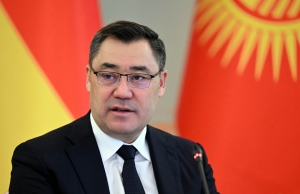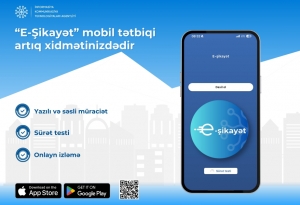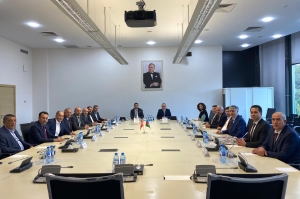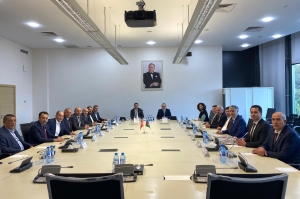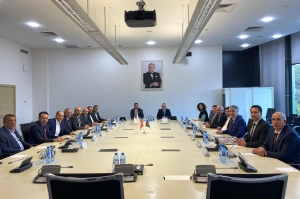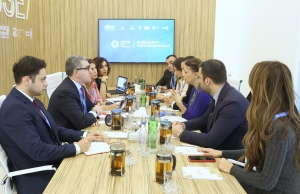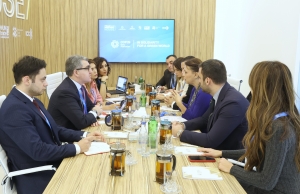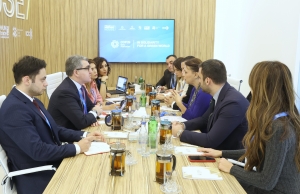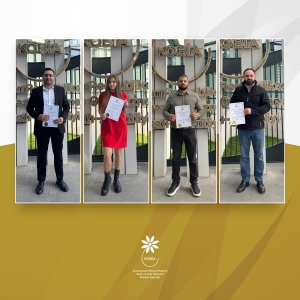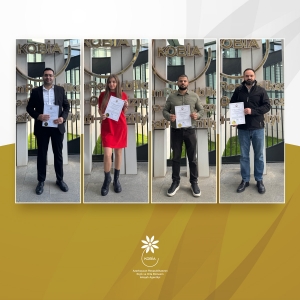Super User
Садыр Жапаров встретился с представителями германских компаний в Берлине
Президент Кыргызской Республики Садыр Жапаров сегодня, 27 ноября, в рамках официального визита в г. Берлин встретился с представителями германских компаний.
Глава государства с удовлетворением отметил широкую представленность германских бизнес-компаний на встрече, среди которых есть как руководители компаний, уже работающих в Кыргызстане, так и компании, рассматривающие возможность сотрудничества с Кыргызстаном.
Об этом сообщает "Caspian Energy Media" со ссылкой на Официальный сайт Президента Республики Кыргызстан.
İKTA “E-Şikayət”in mobil əlavəsini istifadəyə verib
Azərbaycanın telekommunikasiya və poçt rabitəsi sahəsində tənzimləyici qurumu olan İnformasiya Kommunikasiya Texnologiyaları Agentliyi (İKTA) “E-Şikayət”in mobil əlavəsini istifadəyə verib.
“Android” və “iOS” əməliyyat sisteminə malik cihazların istifadəçiləri müvafiq olaraq “Google play”dən və “APP store”dan “E-Şikayət”in mobil əlavəsini yükləyərək istifadə edə bilərlər.
Bu barədə “Caspian Energy Media” İnformasiya Kommunikasiya Texnologiyaları Agentliyinə istinadən xəbər verir.
AZPROMO explores co-op with Kars Chamber of Commerce & Industry
The Azerbaijan Export and Investment Promotion Agency (AZPROMO) hosted a meeting with the Kars Chamber of Commerce and Industry delegation, “Caspian Energy Media” reports, citing AZPROMO.
The meeting involved a wide-ranging discussion on mutual cooperation prospects, joint initiatives, and partnership opportunities.
The delegation received information on Azerbaijan's business and investment climate, special economic zones, liberated territories, and the significant opportunities available for foreign investors.
AZPROMO обсудило перспективы сотрудничества с Торгово-промышленной палатой Карса
В Агентстве поощрения экспорта и инвестиций Азербайджана (AZPROMO) состоялась встреча с делегацией Торгово-промышленной палаты Карса.
На встрече состоялся обмен мнениями о перспективах сотрудничества, совместных инициативах и возможностях партнерства.
Была представлена информация о бизнес- и инвестиционных возможностях Азербайджана, особых экономических зонах, освобожденных территориях, а также о возможностях, созданных для иностранных инвесторов.
Об этом сообщает “Caspian Energy Media” со ссылкой на AZPROMO.
AZPROMO Qars Ticarət və Sənaye Palatasının nümayəndələri ilə görüş keçirib
Görüşdə Azərbaycanın investisiya imkanları barədə məlumat verilib, birgə təşəbbüslərin inkişaf etdirilməsi istiqamətində müzakirələr aparılıb.
İxracın və İnvestisiyaların Təşviqi Agentliyində – AZPROMO-da Qars Ticarət və Sənaye Palatasının nümayəndə heyəti ilə görüş keçirilib. Görüş zamanı qarşılıqlı əməkdaşlıq perspektivləri, birgə təşəbbüslər və tərəfdaşlıq imkanları ətrafında geniş fikir mübadiləsi aparılıb.
Bu barədə “Caspian Energy Media” AZPROMO-ya istinadən xəbər verir.
Meeting held with Montenegrin Minister of Tourism
There was an exchange of views on the possibilities of expanding cooperation with Montenegro in the field of tourism.
Within the framework of COP29, a meeting was held between the Export and Investment Promotion Agency - AZPROMO and a delegation led by the Minister of Tourism of Montenegro, Simonida Kordić.
During the meeting, AZPROMO's Executive Director, Yusif Abdullayev, provided information on the Agency's activities, including the events organized by AZPROMO within COP29, as well as the stands of the Trade and Investment House in the Green and Blue Zones. It was reported that the investment partnership between the two countries is developing, with particular emphasis on the Montenegro-Azerbaijan Business Forum organized by AZPROMO earlier this year.
“Caspian Energy Media” reports with reference to AZPROMO.
Monteneqronun turizm naziri ilə görüş keçirilib
Monteneqro ilə turizm sektorunda əməkdaşlığın genişləndirilməsi imkanlarına dair fikir mübadiləsi aparılıb.
COP29 çərçivəsində İxracın və İnvestisiyaların Təşviqi Agentliyi – AZPROMO ilə Monteneqronun turizm naziri Simonida Kordicin rəhbərlik etdiyi nümayəndə heyəti arasında görüş keçirilib.
Görüşdə AZPROMO-nun icraçı direktoru Yusif Abdullayev Agentliyin fəaliyyət istiqamətləri, o cümlədən COP29 çərçivəsində AZPROMO-nun təşkilatçılığı keçirilən tədbirlər, həmçinin Yaşıl və Mavi zonalarda “Ticarət və İnvestisiya Evi” stendləri haqqında məlumat verib. Bildirilib ki, ölkələrimiz arasında investisiya tərəfdaşlığı inkişaf edir və bu xüsusda AZPROMO-nun təşkilatçılığı ilə bu il baş tutan Monteneqro-Azərbaycan biznes forumu vurğulanıb.
Bu barədə “Caspian Energy Media” AZPROMO-ya istinadən xəbər verir.
Состоялась встреча с министром туризма Черногории
Состоялся обмен мнениями о возможностях расширения сотрудничества в сфере туризма с Черногорией.
В рамках COP29 между Агентством поощрения экспорта и инвестиций – AZPROMO и делегацией во главе с министром туризма Черногории Симонидой Кордич состоялась встреча.
В ходе встречи исполнительный директор AZPROMO Юсиф Абдуллаев проинформировал о деятельности агентства, в том числе о мероприятиях, организованных AZPROMO в рамках COP29, а также стендах "Торгового и инвестиционного дома" в Зеленой и Синей зонах. Было доложено, что инвестиционное партнерство между нашими странами развивается, и в этой связи был особо отмечен Черногорско-Азербайджанский бизнес-форум, организованный AZPROMO в этом году.
Об этом сообщает “Caspian Energy Media” со ссылкой на AZPROMO.
В Азербайджане еще 8 субъектов МСБ получили стартап-сертификаты
Агентство развития малого и среднего бизнеса (KOBİA) в этом месяце предоставило стартап-сертификаты еще 8 субъектам МСБ.
Как сообщает “Caspian Energy Media” со ссылкой на KOBİA, таким образом, количество стартап-сертификатов, выданных структурой субъектам микро- и малого предпринимательства, достигло 182.
Daha 8 KOB subyektinə “Startap” şəhadətnaməsi verilib
“Startap” şəhadətnaməsi almış KOB subyektlərinin sayı 182-ə çatıb.
“Startap” şəhadətnaməsinin verilməsi üzrə Kiçik və Orta Biznesin İnkişafı Agentliyində (KOBİA) yaradılmış Ekspertlər Şurasının növbəti iclası keçirilib. İclasda KOB subyektlərindən daxil olmuş 15 müraciətə baxılıb və onlardan 8-nə “Startap” şəhadətnaməsinin verilməsi barədə qərar qəbul edilib.
Bu barədə “Caspian Energy Media” İqtisadiyyat nazirliyinə istinadən xəbər verir.




